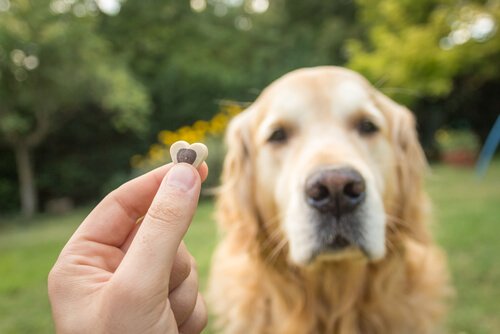How to Train a Dominant Dog
3 minutes


Written and verified by the lawyer Francisco María García
Published: 22 junio, 2018 17:58
Last update: 22 diciembre, 2022 17:57
Some dogs are naturally obedient and calm. On the contrary, some dogs are dominant. They are defined by their great character and personality. You can experience difficulty when trying to train these kinds of dogs. It’s not easy to train a dominant dog. However, with patience and dedication, the task gets easier every time.
Training a dominant dog requires serenity, effort and determination. When someone becomes a dog owner, he/she must know what they’re getting themselves into beforehand. Some breeds are extremely dominant and stubborn. In order to trains these types of dogs, the owner must have to put a lot of effort into it.
Only people with strong characters should adopt a dominant dog. Also, they should have previous experience with these types of pets. A dog with these characteristics is far from being a cheerful and affectionate pet.
How to train a dominant dog
After adopting a dog, many people may have to deal with a strong-willed animal. A dog that has a very dominant personality could walk over any person easily. To train a dominant dog, you’ll need to be aware of some rules and resources. You must follow the training guidelines very strictly, step by step. You must show the dog who’s boss, and who is the pack leader.

The animal must understand that his owner is in charge, not him. Several aspects of canine psychology also come into play when training a dominant dog.
Some breeds are naturally dominant, like the Doberman or Rottweiler. However, some dogs are submissive and become dominant when their owners are passive. For this reason, it’s necessary for a pet to know who’s in charge at all times.
Education and Training Tips
Here are some tips that you should consider when training a dominant dog:
- Teach the dog what’s right and wrong. You need to teach him everything as soon as the animal starts living at your home. Correct his inappropriate behavior, such as jumping up on the bed or urinating inside the house.
- Don’t let the dog take ownership of any rooms. By letting the animal get up on beds, armchairs and furniture, will only reinforce his self-esteem. His dominance will increase, and he’ll think he’s the owner and possessor of everything.
- The dog should eat after the family does. It’s important for the dog to eat after his owner does. In a pack, the dominant dog eats before everyone else. When the owner eats first, the animal will realize that he is not the leader, but the one who takes care of him is.
- Always lead your dog during walks. When walking a dominant dog, the owner must always take the lead. Don’t ever let the animal walk ahead of you.
- Social relationships. The animal must get along with those of his own kind. So, it’s necessary to reinforce friendly relationships.
- Train the dog. Give him basic orders at all times. Sit down, lie down, fetch, among others.
- Don’t lose your patience. Sometimes dogs act like children. They require patience and understanding in order to learn what they should or should not do.
Mutual Cooperation
When you use these simple everyday techniques, the dog will begin to understand his role is in the house. Educating a dominant dog requires commitment, responsibility and patience. If you have all three, you’ll achieve your goal quickly.

However, being your pet’s leader has a different meaning. It’s only meant to help the animal learn to live with people. You should carry out a good leadership role with humility and affection.
In general, dogs always love their human leaders. Therefore, they will protect, take care of, and try to understand people. Relationships between animals and people are better when both sides learn to cooperate. Additionally, a dominant dog will not always be a problem. When you learn to train a dominant dog, the process goes by very fast.
Main image source: El Coleccionista de Instantes Photography and Video
Some dogs are naturally obedient and calm. On the contrary, some dogs are dominant. They are defined by their great character and personality. You can experience difficulty when trying to train these kinds of dogs. It’s not easy to train a dominant dog. However, with patience and dedication, the task gets easier every time.
Training a dominant dog requires serenity, effort and determination. When someone becomes a dog owner, he/she must know what they’re getting themselves into beforehand. Some breeds are extremely dominant and stubborn. In order to trains these types of dogs, the owner must have to put a lot of effort into it.
Only people with strong characters should adopt a dominant dog. Also, they should have previous experience with these types of pets. A dog with these characteristics is far from being a cheerful and affectionate pet.
How to train a dominant dog
After adopting a dog, many people may have to deal with a strong-willed animal. A dog that has a very dominant personality could walk over any person easily. To train a dominant dog, you’ll need to be aware of some rules and resources. You must follow the training guidelines very strictly, step by step. You must show the dog who’s boss, and who is the pack leader.

The animal must understand that his owner is in charge, not him. Several aspects of canine psychology also come into play when training a dominant dog.
Some breeds are naturally dominant, like the Doberman or Rottweiler. However, some dogs are submissive and become dominant when their owners are passive. For this reason, it’s necessary for a pet to know who’s in charge at all times.
Education and Training Tips
Here are some tips that you should consider when training a dominant dog:
- Teach the dog what’s right and wrong. You need to teach him everything as soon as the animal starts living at your home. Correct his inappropriate behavior, such as jumping up on the bed or urinating inside the house.
- Don’t let the dog take ownership of any rooms. By letting the animal get up on beds, armchairs and furniture, will only reinforce his self-esteem. His dominance will increase, and he’ll think he’s the owner and possessor of everything.
- The dog should eat after the family does. It’s important for the dog to eat after his owner does. In a pack, the dominant dog eats before everyone else. When the owner eats first, the animal will realize that he is not the leader, but the one who takes care of him is.
- Always lead your dog during walks. When walking a dominant dog, the owner must always take the lead. Don’t ever let the animal walk ahead of you.
- Social relationships. The animal must get along with those of his own kind. So, it’s necessary to reinforce friendly relationships.
- Train the dog. Give him basic orders at all times. Sit down, lie down, fetch, among others.
- Don’t lose your patience. Sometimes dogs act like children. They require patience and understanding in order to learn what they should or should not do.
Mutual Cooperation
When you use these simple everyday techniques, the dog will begin to understand his role is in the house. Educating a dominant dog requires commitment, responsibility and patience. If you have all three, you’ll achieve your goal quickly.

However, being your pet’s leader has a different meaning. It’s only meant to help the animal learn to live with people. You should carry out a good leadership role with humility and affection.
In general, dogs always love their human leaders. Therefore, they will protect, take care of, and try to understand people. Relationships between animals and people are better when both sides learn to cooperate. Additionally, a dominant dog will not always be a problem. When you learn to train a dominant dog, the process goes by very fast.
Main image source: El Coleccionista de Instantes Photography and Video
This text is provided for informational purposes only and does not replace consultation with a professional. If in doubt, consult your specialist.








